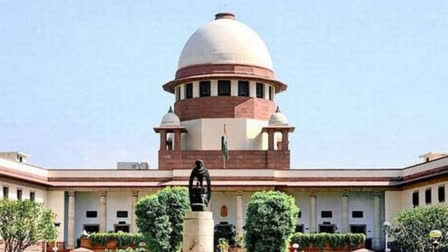New Delhi :The Supreme Court has said that the grant of an interim injunction, before the trial commences, often acts as a ‘death sentence’ to the material sought to be published, well before the allegations have been proven.
A three-judge bench led by Chief Justice of India D Y Chandrachud said: “In essence, the grant of a pre-trial injunction against the publication of an article may have severe ramifications on the right to freedom of speech of the author and the public’s right to know”.
The bench, also comprising justices J B Pardiwala and Manoj Misra, said an injunction, particularly ex-parte, should not be granted without establishing that the content sought to be restricted is ‘malicious’ or ‘palpably false’. Granting interim injunctions, before the trial commences, in a cavalier manner results in the stifling of public debate, it added.
“In other words, courts should not grant ex-parte injunctions except in exceptional cases where the defence advanced by the respondent would undoubtedly fail at trial. In all other cases, injunctions against the publication of material should be granted only after a full fledged trial is conducted or in exceptional cases, after the respondent is given a chance to make their submissions”, said the bench, in its order passed on March 22, which was uploaded this week.
The bench said increasingly, across various jurisdictions, the concept of ‘SLAPP Suits’ has been recognized either by statute or by courts. “The term ‘SLAPP’ stands for ‘Strategic Litigation against Public Participation’ and is an umbrella term used to refer to litigation predominantly initiated by entities that wield immense economic power against members of the media or civil society, to prevent the public from knowing about or participating in important affairs in the public interest”, it said.
The apex court asked the courts to tread cautiously while granting pre-trial interim injunctions keeping in mind the constitutional mandate of protecting journalistic expression.
The bench said the court must be cognizant of the realities of prolonged trials. The grant of an interim injunction, before the trial commences, often acts as a ‘death sentence’ to the material sought to be published, well before the allegations have been proven, it added.
The apex court recently set aside the Delhi High Court's order of March 14, 2024. The high court had upheld the trial court's order directing Bloomberg to take down an article posted online on February 21, 2024 within a week on a plea by Zee Entertainment Enterprises Limited.
“The order of the trial Judge does not discuss, even cursorily, the prima facie strength of the plaintiff’s case, nor does it deal with the balance of convenience or the irreparable hardship that is caused. The trial Judge needed to have analysed why such an ex parte injunction was essential, after setting out the factual basis and the contentions of the respondent made before the trial Judge”, said the bench.
The apex court said without even cursorily dwelling on the merits of the plaint, the ad-interim injunction granted by the trial Judge amounts to unreasoned censorship which cannot be countenanced.
The bench stressed on three-fold test of a prima facie case, balance of convenience and irreparable loss or harm, for the grant of interim relief. “The three-fold test of establishing (i) a prima facie case, (ii) balance of convenience and (iii) irreparable loss or harm, for the grant of interim relief, is well-established in the jurisprudence of this Court. This test is equally applicable to the grant of interim injunctions in defamation suits. However, this three-fold test must not be applied mechanically, to the detriment of the other party and in the case of injunctions against journalistic pieces, often to the detriment of the public”, it added.
The bench said the single judge of the high court perpetuated the error by declining to interfere with the order. The bench also asked the trial court to take a fresh look into the matter after hearing both the parties.
The apex court said since the proceedings are now listed before the trial Judge on 26 March 2024, “we direct that it would be open to the respondents to renew their application for injunction, on which the trial Judge shall pass fresh orders after hearing the parties and bearing in mind the observations which are contained in the above segment of the judgment and order”.
The bench said the three-fold test cannot merely be recorded as a mantra without looking into the facts on the basis of which an injunction has been sought. “In the absence of such a consideration either by the trial Judge or by the High Court, we have no option but to set aside both the orders of the trial Judge dated 1 March 2024 and of the Single Judge of the High Court dated 14 March 2024. We do so accordingly”, it said.
Read More
- ‘Criminal Investigation Must Be Fair’, SC Directs CBI Probe Into Death Of Manipuri Woman In 2013
- 'Sad, Brings Shame On Justice Delivery System': SC On Police Parading Accused
